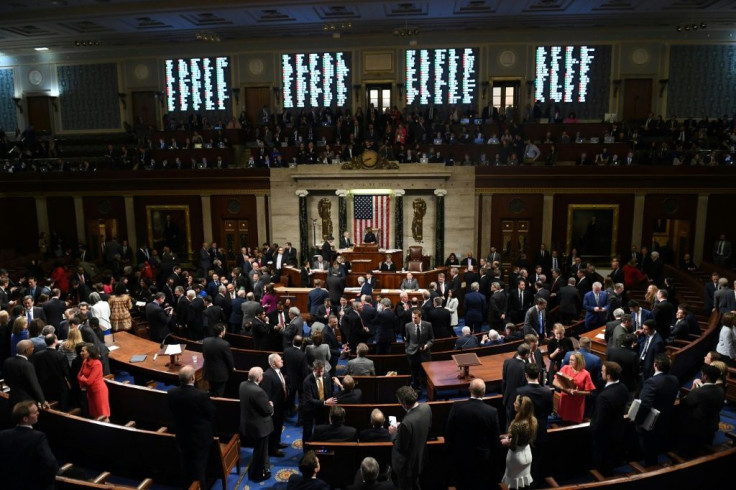How Does Trump Impeachment Differ From Clinton, Nixon, Johnson? Trial May Be Delayed

KEY POINTS
- The Senate never has removed a president from office
- Pelosi may delay sending articles of impeachment to the Senate
- Unlike previous impeachment trials, Senate has no plans to call witnesses
The U.S. Senate never has removed a president from office, but the impeachment trial of Donald J. Trump differs markedly from its predecessors.
“People have a spring in their step,” House Speaker Nancy Pelosi said the morning after Wednesday’s Trump impeachment vote.
The House voted mainly along party lines to impeach Trump on charges of abusing the power of his office for personal gain and blocking Congress from investigating his conduct. Only two other presidents – Andrew Johnson and Bill Clinton – have been threatened with removal from office, also during highly partisan times. Richard Nixon resigned before the full House could vote to impeach him.
Clinton eventually admitted what he’d done was wrong and apologized; Trump repeatedly has denied any wrongdoing.
This time around it is unclear how the process will proceed.
When Clinton faced allegations in 1992 of lying to a grand jury about his sexual conduct and obstruction of justice – two statutory crimes – Democrats and Republicans negotiated trial procedures. This time around, Senate Majority Leader Mitch McConnell has said he will coordinate with the White House and already has denied Democrats requests to hear from key administration officials Trump prevented from testifying before House investigators.
Had Nixon allowed things to play out in 1974, he would have faced charges of obstruction of justice, abuse of power and contempt of Congress for the Watergate burglary coverup.
In the 1868 impeachment of Johnson, following highly partisan wrangling in the wake of the Civil War, the president was accused of violating the Tenure of Office Act, which prohibited him from firing appointees without Senate approval. He had opposed congressional efforts to accord wider rights to newly freed slaves and punish the South.
No statutory crimes were alleged in the Trump impeachment articles, and Pelosi now is contemplating holding off on transmitting them to the Senate, an idea that touched off outrage from Trump, who was anticipating using his all-but-certain acquittal as a campaign talking point and who accused Pelosi of being “afraid.”
Senate Judiciary Committee Chairman Lindsey Graham, R-S.C., who has said he’s uninterested in any evidence that could prove Trump’s guilt, accused Democrats of setting up a constitutional crisis by not transmitting the impeachment articles expeditiously, and saying the idea is gaining traction because the case against Trump is weak
Constitutional crisis unfolding before our eyes.
— Lindsey Graham (@LindseyGrahamSC) December 19, 2019
Senior Democratic leaders are openly contemplating refusing to send Articles of Impeachment to the Senate for disposition.
Trump Derangement Syndrome is reaching a new level! https://t.co/WHYOeC0ZiL
Nancy Pelosi’s threat to refuse to transmit the Articles of Impeachment to the Senate for disposition is an incredibly dumb and dangerous idea.
— Lindsey Graham (@LindseyGrahamSC) December 19, 2019
There is a reason one person can’t be Speaker of the House and Senate Majority Leader at the same time!
If House Dems refuse to send Articles of Impeachment to the Senate for trial it would be a breathtaking violation of the Constitution, an act of political cowardice, and fundamentally unfair to President @realdonaldTrump.
— Lindsey Graham (@LindseyGrahamSC) December 19, 2019
“ This particular House has let its partisan rage … create a toxic new precedent that will echo into the future,” McConnell said Thursday.
Senate Minority Leader Chuck Schumer, D-N.Y., said all Democrats want is a “fair trial,” but McConnell has no intention of conducting one. Schumer had asked for the ability to call acting White House Chief of Staff Mick Mulvaney, former national security adviser John Bolton and Secretary of State Mike Pompeo as witnesses, all of whom are believed to have first-hand knowledge of whether Trump withheld $391 million in military aid to Ukraine to force that country to investigate former Vice President Joe Biden to give the president ammunition for the 2020 election campaign.
Trump’s defenders have keyed on the use of the word “us” in Trump’s July 25 phone call with Ukraine President Volodymyr Zelensky, during which he asked Zelensky to “do us a favor.” Defenders said Trump used “us” as meaning the United States while accusers said it was a form of the royal “we.” The accusers may be right.
A Jonathan Bernstein opinion piece on Bloomberg noted Thursday Trump undercut that defense even as the impeachment vote was being taken.
During a rally in Battle Creek, Michigan, Trump said: "It doesn’t really feel like we’re being impeached. ... We did nothing wrong. We have tremendous support in the Republican party."
© Copyright IBTimes 2025. All rights reserved.






















